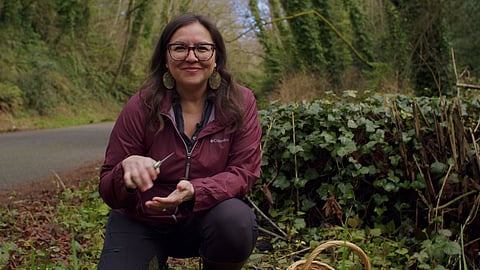Pull Up a Seat at the 'Old Growth Table' to Connect With Indigenous Food Traditions
Started in 2019 by Matika Wilbur (Swinomish and Tulalip) and Adrienne Keene (Cherokee Nation) — with later seasons co-hosted by Desi Small-Rodriguez (Northern Cheyenne and Chicana) and Temryss Lane (Lummi Nation) — the All My Relations podcast is focused on Indigenous people's relationships with the land, creatures, and one another. As it has expanded through the years, it has pulled in the work of other Indigenous creators. Among its latest additions is a subsection of the podcast series titled Old Growth Table, focused on traditional foods and culturally specific foodways.
A collaboration with Valerie Segrest, a nutrition educator and community-based storyteller from the Muckleshoot Indian Tribe, Old Growth Table is a work long in the making, emphasizing how Indigenous relationships to food are not just things of the past, but very much of the present.
"[The podcast] began as a conversation between relatives just dreaming of a place where we could gather stories the way our people have always gathered food: carefully, seasonally, and with reverence," shares Segrest. "We realized that so much of the knowledge lives orally, and this podcast became a place where teachings could sit for a while. It felt important to bring it to life now, as so many of us are hungry for connection — to each other, to the earth, and to the food that sustains us."
In the inaugural episode of Old Growth Table, Wilbur explains that getting the proper infrastructure in place to welcome other creators and implement their projects has taken many years and much effort. Previous episodes of All My Relations were recorded in various locations, from the creators' homes to more formal spaces, like the Tacoma Art Museum and the Hibulb Cultural Center. Now, each episode is filmed in Wilbur's studio space in the Tidelands Native Art Gallery, which is located in downtown Seattle and is part of the Seattle Restored storefronts program, which helps subsidize rents for creative spaces. Along with podcasts, Tidelands Gallery also regularly hosts art exhibitions, and its team works with other types of media, such as photography and videography.
"My great big goal … has been to 'spread the table,' so to speak," explains Wilbur. "We're longhouse people; what we do is spread the table, and we give away what we've acquired. That's what we're hoping to do here … launch new stories, make new storytellers."
Segrest has long made a reputation for herself by working with traditional foods and reclaiming Indigenous relationships to the land through what she describes as "nourishment, teachings, and deep remembering." She brings this expertise and a friendly demeanor to Old Growth Table, which features discussions around the gathering and preparation of foods, with each episode centered around one of the seasons.
The first episode, "Our Food Is Our Medicine," was released in April 2022 and focused on wild spring greens, such as nettles and dandelions. The second episode, "Sacred Hydration: Infusions, Ancestors & Listening to Water," was released in late May and discusses water and conifer trees; future episodes will cover salmon, seeds, hunting stories, and Native food businesses. While each month's episode will be focused on food, the creators intend to cover a wide range of traditions.
"While each territory carries its own specific wisdom, there is a common thread that ties us all together, a reverence for the foods that have sustained us for generations," says Segrest. "By weaving in voices from many nations, we are creating a shared table where stories can travel. My hope is that this podcast serves as a bridge, between tribes, between generations, between old ways and contemporary movements. It's an offering of unity through nourishment."
Podcast guests will vary per episode, aligning with the topics at hand. Among those who have made an appearance are well-known individuals working across the country, including Sean Sherman, also known as "The Sioux Chef," who runs Owamni in Minneapolis, and Mariah Gladstone, founder of Indigikitchen. Taking knowledge from diverse sources shows how the Indigenous food movement is not just rooted in one place, but finds similarities across cultures as well.
Segrest stresses that the movement is built on love, abundance, and remembering — not loss. Reclaiming joy around Indigenous knowledge is a key motivating factor that excites her.
"I see young people tanning hides, aunties teaching jam-making, uncles fishing at first light, and children learning the names of plants in their Native language," she explains. "This reclaiming work brings healing, not just to our bodies, but to our communities and ecosystems. The more we remember, the more resilient we become. The implications for the future are transformational; it means a return to reciprocity."
With The Old Growth Table, Segrest hopes Indigenous listeners feel a sense of home, encouraging a feeling of "sitting around the table with cousins, elders, and knowledge holders," and that it "sparks memories, affirms what we know in our bones, and inspires action, whether that's planting a seed or teaching a child about their first foods."
For non-Indigenous listeners, Segrest hopes the podcast invites them to "listen deeply, to learn with humility, connect how your traditions may be similar, and to reflect on the land you live on."
After all, she concludes, "we all have a role in tending to this earth, and these teachings offer a path forward that is relational, respectful, and rooted in care."
The Emerald's environmental reporting is funded in part by the City of Seattle's Environmental Justice Fund.
Editors' Note: This article was updated to include additional co-hosts for the All My Relations podcast who were previously not listed.
Help keep BIPOC-led, community-powered journalism free — become a Rainmaker today.



